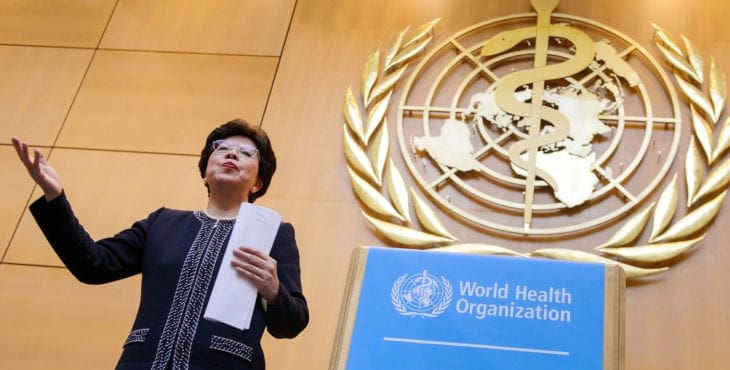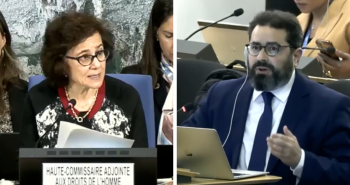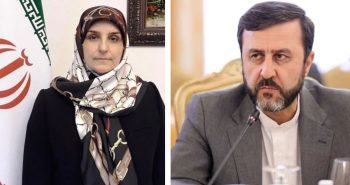Outgoing WHO director-general Margaret Chan
GENEVA, May 26, 2017 – The U.N.’s World Health Organization “decided to hide a positive report on Israel from the public eye” under pressure from Syria’s Assad regime, according to Israel’s representative, Ambassador Aviva Raz-Shechter, as the world body’s annual assembly adopted a resolution co-sponsored by Syria yesterday that targeted Israel over “Health conditions in the occupied Palestinian territory, including east Jerusalem, and in the occupied Syrian Golan.”
The resolution, which will cost $10 million to implement, renews the annual naming and shaming of Israel by renewing a special agenda item on the country at next year’s session, as well as mandating a report by WHO’s director-general, measures of scrutiny applied to no other country.
Confirming Israel’s account, Germany, Italy, the Netherlands, Norway, and 10 other countries (see list below) took the floor to express regret that while Israel co-operated with a WHO mission to the Golan, “the report of that mission was not published, not even the parts which had already been completed.”
“This is clearly due to the Syrian behavior,” said the EU countries, “which we can only condemn in the strongest terms. This is particularly deplorable in view of the abysmal health situation in other parts of Syria. According to the UN, last year alone, more than 300 medical facilities in Syria were targeted.”

WHO hid the positive report “rather than standing up to the brutal Syrian regime,” tweeted Raz-Shechter. In its report, the WHO—falsely, it would appear from the EU statement—blamed its omissions on “time constraints” and “additional information needed.” (See full quote at bottom.)
#WHA70 the @WHO rather than standing up to the brutal #Syria-n regime, decided to hide a positive report on #Israel from the public eye.
— Aviva Raz Shechter🇮🇱 (@AvivaRShechter) May 25, 2017
This year’s text, co-sponsored by Syria and the Palestinians, along with Algeria, Cuba, Ecuador, Egypt, Kuwait, Libya, Pakistan, Saudi Arabia, South Africa, Tunisia and Venezuela, removed explicit language condemning Israel that was in last year’s resolution, likely as a bid to garner EU support.
The vote to maintain the WHO spotlight on Israel for next year was 98 to 7, with 21 abstentions. (See full voting chart at bottom.)
The UK changed its vote from last year, switching from Yes to No, joining Australia, Canada, Guatemala, Israel and Togo in the opposition.
Those abstaining were Antigua and Barbuda, Armenia, Bulgaria, Colombia, Côte d’Ivoire, Croatia, DR Congo, Dominican Republic, Gabon, Haiti, Honduras, Hungary, Iceland, Latvia, Malawi, Mexico, New Zealand, Panama, Saint Kitts and Nevis, East Timor, and Tuvalu.
“For the U.N. to allow Syria’s Assad regime to influence its focus on health conditions is absurd,” said Hillel Neuer, executive director of the Geneva-based UN Watch, a monitoring group accredited with consultative status at the United Nations.
“It is the height of cynicism for Syria to introduce a resolution on the health of Druze residents of the Golan Heights, who in fact live very well under Israeli jurisdiction, even as Assad bombs his own hospitals, ambulances and medical workers. The U.N. should reject the hijacking of its world health agenda by Arab regimes and allied dictatorships like Cuba and Venezuela.”
“Notably, the UN assembly will not address Syrian hospitals being bombed by Syrian and Russian warplanes, or millions of Yemenis denied access to food and water by the Saudi-led bombings and blockade, nor will it pass a resolution on any other country in the world.”
“Out of 24 items on the meeting’s agenda, only one, Item No. 19 against Israel, focuses on a specific country. And the only mention of Syria is not focused on Syria, but rather on Israel.”
“The U.N. discredits itself by enacting a resolution which effectively accuses Israel of violating the health rights of Syrians in the Golan, when in reality Israeli hospitals continue their life-saving treatment for Syrians fleeing to the Golan from the Assad regime’s barbaric attacks.”
In the real world, Syria drops barrel bombs on its own hospitals. In the UN world, Syria co-sponsors @WHO resolution today targeting Israel. pic.twitter.com/cxKTcPd6dT
— Hillel Neuer (@HillelNeuer) May 25, 2017

Notable Quotes:
Following the vote, 14 European countries (Austria, Cyprus, Czech Republic, Denmark, Estonia, Finland, Germany, Greece, Italy, Lithuania, Norway, Poland, Slovakia and The Netherlands) condemned Syria and praised Israel:
We regret that – despite Director-Genera Chan’s efforts – it was not possible to adopt the present decision by consensus…
We welcome the constructive approach taken by Israel, which gave its consent to the WHO mission in the occupied Syrian Golan… It is all the more regrettable that the report of that mission was not published – not even the parts which had already been completed.
This is clearly due to the Syrian behavior, which we can only condemn in the strongest terms. This is particularly deplorable in view of the abysmal health situation in other parts of Syria. According to the UN, last year alone, more than 300 medical facilities in Syria were targeted”.
Iran used the World Health Assembly as a forum to reiterate that it doesn’t recognize Israel:
In line with our consistent positions, we express our reservations concerning those parts of the draft […] and the report […] that might be construed as recognition of the Israeli regime.
From WHO report explaining why it hid parts of the report praising Israel, due to “time constraints” and “additional information needed”:
A team of three WHO experts in public health, clinical medicine, and emergency preparedness and response carried out a field visit in the occupied Syrian Golan from 17 to 20 March 2017. The limitations of the assessment included time constraints, additional information needed – including through interviews with relevant authorities and stakeholders – and lack of availability of disaggregated data for the Syrian Arab population. Tackling these limitations will require further steps. The 17–20 March visit laid the groundwork for a more complete assessment, in implementation of the mandate provided by decision WHA69(10) requesting the Director-General to report to the Seventieth World Health Assembly, and for which planning is ongoing.







